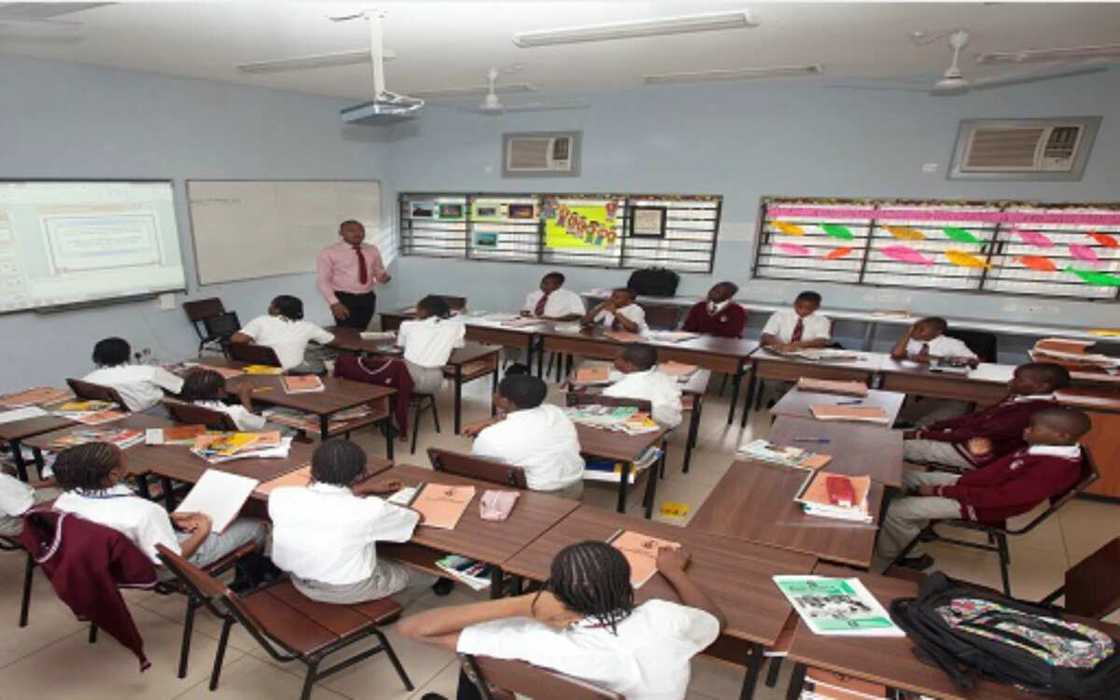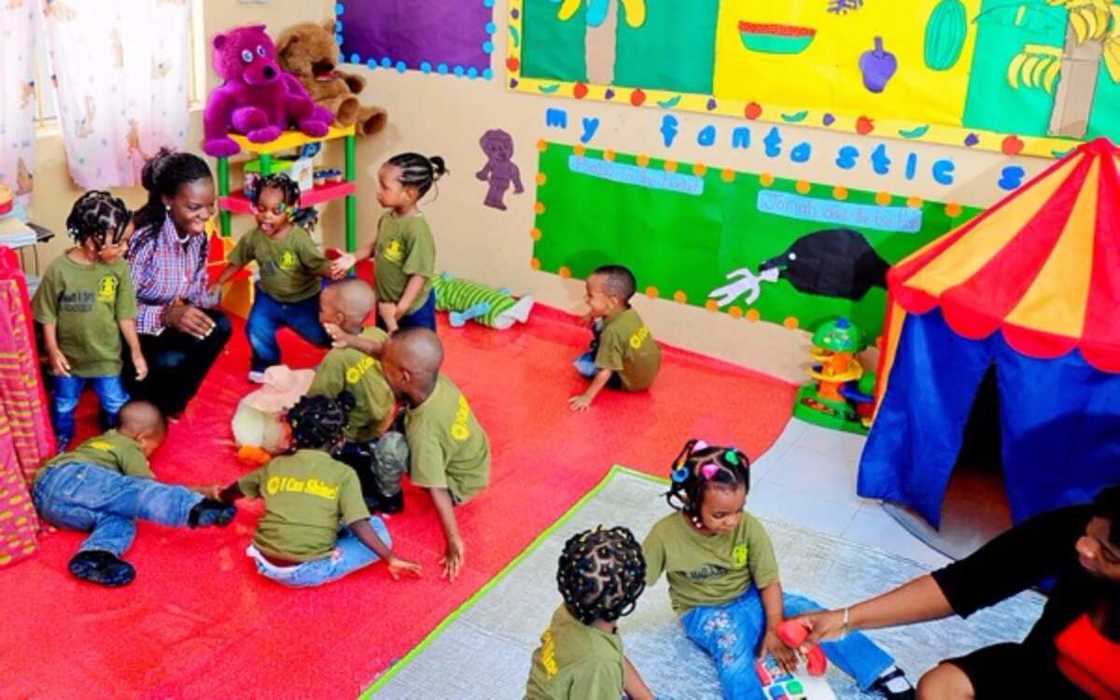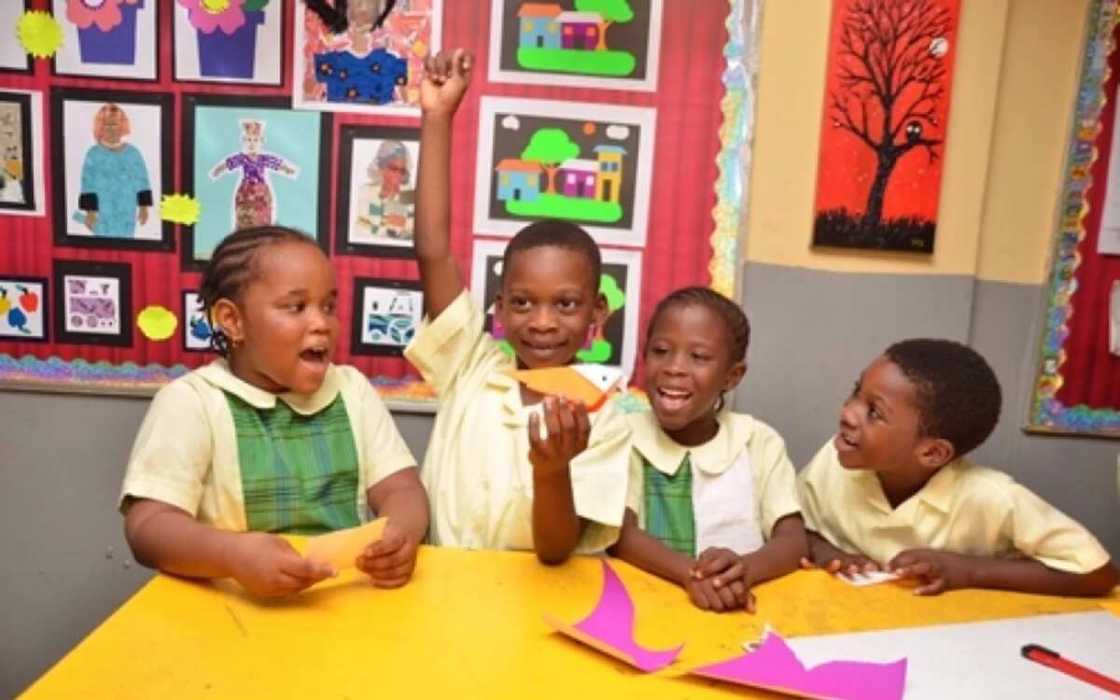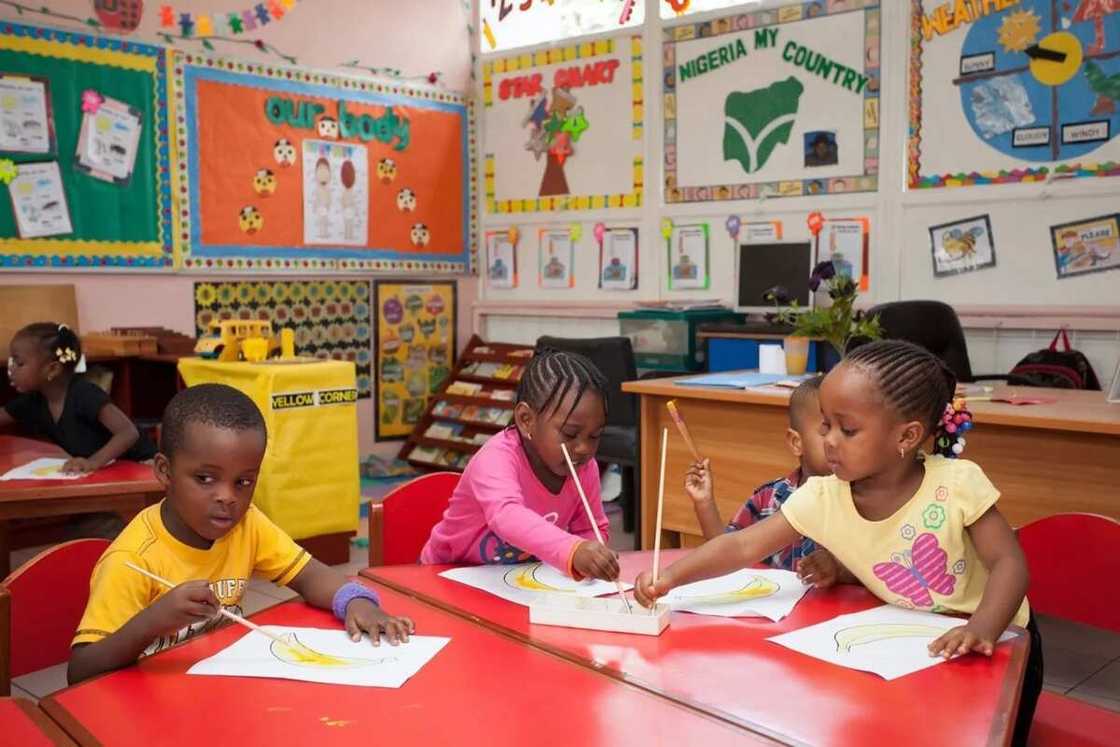INVESTIGATION: Why Nigerian elitist schools prefer British education curriculum over Nigeria system
Editor’s note: Education is unarguably is key to human survival and every child is entitled to quality and qualitative education.
In an investigation carried out and sent to Legit.ng, Austin Oyibode revealed how most elitist schools abandon Nigeria education curriculum in preference for British curriculum.
“Teaching with the British curriculum in schools helps the children discover their interests and potentials early enough.”
This was the justification given by Amos Eboka, director of Patricia Group of Schools Asaba as to why majority of Nigerian big private schools are applying the British curriculum as opposed to the straight Nigerian curriculum.
The British curriculum, otherwise known as the National Curriculum of England, is a statutory national curriculum framework that was developed by the United Kingdom government to help guide administrators as well as tutors on integral aspects related to the educational development of children of school age who live in the United Kingdom or have direct connections to it.
Overtime, however, the curriculum is no longer restricted to Great Britain but has found its way into Africa, dominating the education sector in some countries and is now even defined as the globally acceptable standards in some countries.

The curriculum being designed and structured by the Nigerian Educational Research and Development Council (NERDC) which is based on the National Policy on Education (NPE) of 1977 (last reviewed in 2004) is being jettisoned by big private schools on the ground of non-conformity to international standards. Countless big private schools in Nigeria have been observed to be guilty of this practice.
READ ALSO: 'You left Nigeria in tatters' - Buhari lists facts to remind Jonathan
It was in justifying this development that Mr. Eboka stated that the curriculum was not a complete deviation from the Nigerian curriculum as most persons assumed, but is simply targeted at teaching the same things in the Nigerian curriculum by using effective and child-friendly methods.
He explained that the British mode, which is closely linked to the Montessori system of learning, is simply a more flexible teaching style that takes the interests of each child into consideration.
According to him, the early and foundational classes tend to be a bit slow as the teacher tries to move at the child’s pace, but as soon as they grab the basics, everything gets smooth and easy.
“The first obvious difference is the style of teaching especially in the foundational classes, a lot of illustrations, pictures and figures are used to enable the child gets a firm grasp of things rather than just cramming.

"Unlike our days where we were simply made to cram and recite the multiplication tables every day, this time, the children are made to see how 6 times 4 becomes 24, instead of them just cramming. They are made to understand the process so that they can easily replicate it, just as one of the requirements in mathematics is for the child to show the workings step by step.
“The child is placed in a comfortable and conducive environment where he is allowed to discover, while the teacher acts as a guide.
"This is unlike the kind of education most of us grew up with where we went to school and were made to take in everything the teacher teaches hook, line and sinker, most times without understanding how this process of how words are formed from sounds and letters and how arithmetic solving leads to the answers,” he asserted.
According to Mr. Eboka the sitting arrangements applied especially at the basic level is not the strict and formal one where the teacher stands to teach and the pupil sits to listen, but a more informal arrangement where the teacher sits with them in round table and kidney shaped tables where they learn at the child’s pace.
It encourages the teacher to work with each child based on his or her personality type so that the more shy and reserved ones are encouraged to gradually open up and mix with their mates while the boisterous and sociable ones are also made to calm at some point to learn.
He noted that not all the children might be in the mood to learn at the same time. Some might want to play while the others want to play with some toys while some might be in the mood for some sort of creative work. All the children are thus encouraged to discover their soft motor and psychomotor skills, while also making them to know how to read at the early age of 4 to 5 years.
This line of thought was emphasized also by Mrs. Annette Nwanne, an educationist and expert who explained that the pupils at the early stage are taught the different letters and their sounds, and how to identify them; they are later introduced to the 42 sounds.
As soon as they get it, they can easily pronounce words as the sounds have already been pre-programmed in their minds. She insisted that the British curriculum helps the child’s diction making them able to fit in especially when they go out of the country to school.

She debunked the assumption that it prevents the child from mastering his or her native language, stating that on the other hand, it helps the child to become the master of any language he chooses to speak.
“What it ensures is that the child is able to speak English like an English native without mother-tongue interference, and also speak his own native language with the required accent. It distinguishes the language in the mind of the child and helps him understand and respect languages.
“When you see children who were not taught with the British curriculum, when they go outside the country they have difficulty understanding the whites when they speak, and they keep saying ‘pardon’ ‘I didn’t get you’ and so on, but when they are taught with it from the foundation, they understand it clearly.”
She also insisted that the curriculum contains all that is found in the Nigerian curriculum and even more, but that the mode of teaching and class arrangement is different. Even the foreign textbooks used employs a lot of pictures, colours and illustrations and that is why the children hardly forget what they have been taught.
They are also made to get involved in various extra-curricular activities which ensure an all-round development of the child, as the school is not only meant to address the academic needs, but also the social and psychological needs of the child.
On their social life, Mrs. Nwanne who is also the Head-teacher of Patricia Nursery and Primary schools noted that children who are taught using the British curriculum are generally more sociable, confident, bold and can interact with people of different age range.
“This is as a result of the fact that they have been taught in a class system where the teacher encourages them to speak out, contribute and interact, and where they are gently and lovingly corrected even when they make mistakes.
"Unlike those children who started out in a class arrangement where the teacher teaches and the pupils learn everything without their opinion being taken into consideration.”
For Dr. (Mrs.) Glory Ogugua, proprietress of Dell International School in Asaba, the British curriculum is good same way Nigerian curriculum is good. She, however, said most Nigerian parents, prefer the Nigerian way of learning.
She explained that in the British system, if a teacher wants to teach fraction, instead of telling the child it is ¼, the British prefer using physical items displayed before the children to aid faster and better understanding.
“The British will bring apple into the class, cut it into four and demonstrate it before the child. The system makes it simpler for the child to understand the concept of fraction and it is easy to comprehend,” Dr. Ogugua explained.
However, she said the system is expensive. According to her, the cost of running the British system is not within the reach of the average Nigerians, hence, most Nigerian parents go for schools that operate primarily the Nigerian education curriculum.
She said some British schools charge as much as N1.5million per term as tuition fees. She explained that the high cost of the tuition fees is not unconnected with the materials used for teaching the children.
“If you compare those schools that are fully into British and those schools that adopt a little of British and a little of Nigerian, their fees can never be the same.
Those who do full British charge higher fees. You can’t be coming to a British school and you want to pay N120, 000. It can’t work. They will tell you all things you pay for. You pay for this and that. Even Mathematics has a game. That is the British method; they make things easier for you but expensive.
“The British method makes learning simple. It is expensive because of the money involved. If you are teaching a secondary school child, there are different things you need to purchase; even arranging the method takes good money.
"All Montessori equipment is expensive. Like a child of two or three, you want to teach the child that after one is two, you use something like staircase where you keep ascending, everything is dramatized for the child to see.”
Dr. Ogugua explained that most of the Nigerian schools that are fully Britain are essentially aimed at preparing the children for British examinations like TOEFL, SAT, IELTS and those intending to school abroad after their secondary education in Nigeria. But she added that some of these children do not go abroad at the end of their education.
There are, however, those who feel that the use of British curriculum in Nigeria is a subtle way of enhancing neo-colonialism.
One of such teachers, Mrs. Rosemary Okwukwe, an educationist, insists that there is no wisdom in applying the British curriculum in teaching our Nigerian children within the shores of the country, when Nigerian curriculum is not being applied in the United Kingdom.
She emphasized that most parents who are even insistent on the British curriculum have neither the plans nor the wherewithal to send their children abroad.
“Most of them just want to be proud to say that their child went to a British school and speak Queens’ English.
“Eventually those children who were taught with the straight Nigerian curriculum but still went out of the country to school, they still fit in there and even excel because the Nigerian curriculum has stretched them and enhanced their brain capacity to fit in anywhere, rather than the British curriculum which wants to simplify even the most basic things,” she stated.
According to her, "where the British curriculum aims to simplify everything and is suitable for application in the United Kingdom, the Nigerian curriculum which was designed by Nigerians for Nigerians aims to stretch the child’s mind and enhance his capacity, making him able to reason things for himself and making him tough enough to fit in anywhere in the world.
This, in her opinion, is the reason that most Nigerian children who started poor attending government schools which did not practice the curriculum are still able to excel when they get an opportunity or a scholarship which takes them to school outside the country. “We always hear of them graduating as the best students with First Class degrees.”
She argued that training Nigerian children in Nigeria with a foreign standard is like manufacturing products in Nigeria and ignoring the standards set by the Standard Organisation of Nigeria (SON) to settle for foreign standards.
PAY ATTENTION: Read the news on Nigeria’s #1 new app
“Why should that be the case? Do you want to export the children for foreign consumption or do you want them to function in the Nigerian environment and contribute to the country? These questions should be answered before people rush into avoidable errors.
Notably, the practice of applying the British curriculum either alone, or mixed with the Nigerian curriculum is found in big private schools, something which has been attributed to their need to sell to the public. Mrs. Nwanne noted that the government schools are not necessarily looking for patronage and so they see no need to apply new teaching trends in their schools.
The private schools are looking for patronage and so, they constantly see the need to send their teachers on refresher courses, to update with new and emerging teaching trends all around the world.

This enables them to create an environment where the child can acquire skills beyond reading and writing, skills such as creative skills, social skills, communication and language skills and cognitive skills.
However, this method has been criticized due to the high nature of the school fees especially that of schools practicing a full British curriculum whose fees cannot be afforded by the average or middle class Nigeria.
Many are also of the opinion that running any form of foreign curriculum in Nigeria is tantamount to describing the Nigerian mode of education as inferior. As the saying goes that when in Rome, one should behave as the Romans; these groups of persons insist that when in Nigeria, the Nigerian mode of education should be practiced.
However, some still suggest a need to review the Nigerian curriculum in line with existing trends, such that the curriculum would no longer be regimented or too theoretical, but becomes more technological and creativity based, to enable them become independent when they are through with their education, rather than just waiting on white-collar jobs which the curriculum emphasizes.
But office of the Chief Inspector of education (CIE) in Asaba, Delta state, told our reporter that the education ministry is not aware of this development.
Although the CIE was not around his visit, Legit.ng reporter was, however, directed to the department of education research where he was told that although the ministry is not aware of that, staff of the office who did not want to be named, said schools using the British curriculum are only doing that to grow their ego and project their reputation.
They argued that all schools in Nigeria whether private or public write the same national examinations.
They said primary and Junior School pupils write the same examination prepared by state ministries of education while senior secondary students across the country write the same examination conducted by the West African Examinations Council (WAEC) and National Examinations Council (NECO).
Hence, they are therefore of the opinion that there is no need using British curriculum when the children will not write British examinations in the secondary school days.
Meanwhile, Legit.ng had previously reported that over 80-percent of schools were operating way below the standards attainable, with poor infrastructures and a seeming lack of qualified hands being the major issues faced.
Watch this Legit.ng video as Nigerians speak on past presidents:
Source: Legit.ng


